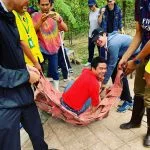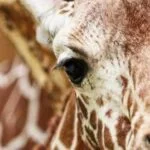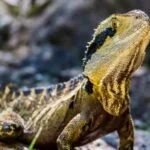Embracing New Training Opportunities
The Wild Welfare team is no stranger to challenges, dealing with them every day in the quest to improve animal welfare standards across the globe. The most unprecedented of these challenges is of course the impact of coronavirus. It has halted the team’s ability to travel to project countries, as well as hugely impacting fundraising. However, as ever, we have adapted to the circumstances and evolved a new way of delivering our welfare training workshops which would usually be hosted in-country.

Amu our Welfare Bear practising his presenting techniques at a conference in Vietnam.
Moving our training programmes online will enable us to further our reach, teach and inspire even more animal care staff in welfare concepts and practice. This is important in helping us achieve our vision. Passing specific and practical skills and knowledge on to more animal care staff through evidence-led training will encourage improvements and understanding in animal welfare standards in more facilities.
Our training programmes cover all aspects of wild animal care within captive facilities, from healthcare and veterinary techniques, to the provision of appropriate animal nutrition and encouragement of positive behaviours, as well as species-specific care. We also consider ethical conundrums that animal carers may face on a daily basis and provide clear approaches and direction for practical assessment and monitoring of animal welfare standards. All this information is being adapted to an engaging and interactive online platform so we can continue with our important partnerships. Even once we can deliver face to face in-country training again, our online portals will remain accessible and practical for our programmes of work.
To achieve our goal of creating an online learning portal, the Wild Welfare team is mastering the intricacies of hosting live and recorded webinars. The team are all well versed in delivering training programmes in person but delivering them remotely through an online portal is a concept which we have had to familiarise ourselves with and adapt to.
We want to ensure our presentations are streamlined and easily accessible even if the presenter is only virtually present. The first phase of developing our online training is converting specific components of our training programmes to an accessible webinar package. Body language is an incredibly important tool when providing practical training, both from the trainer understanding how the recipients are responding and vice versa, making adaptions to that interaction to ensure successful understanding of content. Without the ability to interpret training success through body language, the team will be ensuring the webinars are successful through interactive Q and As, feedback forms and accessible materials.
Wild Welfare’s training is centred on creating environments to instill confidence, encourage inclusivity and focus on problem-solving activities, which can help individuals learn complex topics more easily. Priority training to be delivered is on the principles of welfare auditing, in particular, training others how they can become effective auditors. Welfare audits are essential because they highlight the most pressing welfare improvements that should be prioritised within a facility according to a set operational standard.
Wild Welfare’s field director, Dave Morgan said: “The training of auditors is absolutely essential to ensure consistency in the interpretation of standard criteria, and to prevent subjective bias.
This auditor training when conducted in-country consists of two components:
- Classroom-based: Concepts of audit practice including topics such as modern approaches to animal welfare, the structure of welfare audit practice against a Welfare Standard, what is required of welfare auditors and familiarisation with the Welfare Standard.
- On-site practical: The physical performance of a welfare audit against the Welfare Standard through oversight of a trial audit of a pre-selected zoo or aquarium.
“At this stage, our emphasis with the online training will be the classroom-based training and we are currently adapting all our training materials in this regard, into a format that can be delivered through a remote, online platform. We aim to have completed the first suite of these online packages by the end of August 2020,” Dave Morgan added.
The second phase of the training involving the actual on-site audit can of course, only be done once the team are able to travel internationally again. However, while we wait for travel restrictions to ease, the online presentations will provide a solid base for trainees to prepare for the actuality of the physical onsite audits themselves.
This was all possible due to a generous donation from Wildlife Reserves Singapore (WRS) who were keen for our training workshops to be available remotely to continue our work improving animal welfare standards. They have partnered with us on previous projects and we are very grateful to have their ongoing support.
~ENDS~
Notes to Editors
For more information or interview requests please contact Wild Welfare on communications@wildwelfare.org
Wild Welfare is a global organisation committed to improving animal welfare for captive wild animals. By uniting the world’s leading zoos, zoo associations and animal welfare organisations, we build trusting partnerships that help provide long-term solutions to critical wild animal welfare issues.
Our vision is to end the suffering of captive wild animals around the world and ensure full and sustainable protection is given to all animals in human care. Find out more at wildwelfare.org. Registered charity in England (no.1165941).





